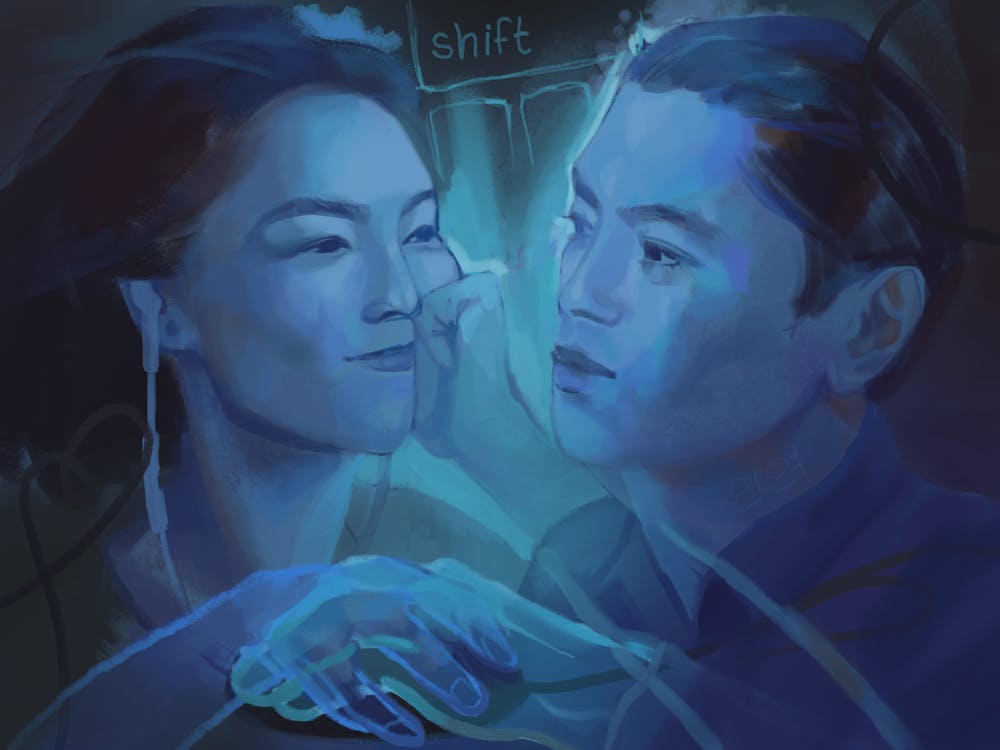On paper, Celine Song’s Past Lives is a simple movie. A girl named Na-young has a crush on her classmate and close friend, Hae Sung, until her family decides to immigrate from Korea to Canada and she leaves. The two find each other on social media years later and briefly keep in touch before their adult lives pull them apart once again. Only years later do Na-young, now married and going by Nora, and Hae Sung reunite in New York.
In those two days of reunion, there is no passionate affair or even a kiss as they explore the city’s famous tourist spots. It is not a question of the classic love triangle trope either—Nora and her husband have a loving relationship built on a strong foundation of trust that almost seems unrealistic. Her husband is aware of Nora and Hae Sung’s deep emotional connection but makes no attempt to persuade her out of spending time alone with him. Squished on a flight between two strangers, my cat shoved under the seat, I cried with Nora at the end of the movie as she said goodbye to Hae Sung. This movie is an exploration of life’s endlessly torturing and hopelessly romantic what-ifs. What if Nora had remained Na-young and never left Korea? What if Nora had never gotten married? What if there are past lives, described in the movie as the Korean concept of inyeon, and our souls are intertwined in over 8,000 other lifetimes? Or what if social media has fundamentally exacerbated our access to these what-ifs, enabling us to connect to anyone from any point in our lives across any corner of the globe? Maybe today the what-ifs are much more difficult to shake.
While the isolated plot of the movie may be sparse in action, the interactions between the two childhood sweethearts from youth to adulthood are real and distinctly captivating without being cheesy. Nora is a fiercely independent playwright living in New York with an ambitious streak, and Hae Sung jokingly asks her in each stage of their lives—childhood, college, and adulthood—which new prestigious award she is chasing. Hae Sung is a more humble, stoic, and romantic tragic hero from beginning to end, accepting second place to her in school and flying to New York as an adult just to see her again. Nora claims that the girl version of herself that Hae Sung remembers is gone—she is no longer the crybaby twelve-year-old named Na-young he once knew—yet they retain their same motifs in relation to each other through adulthood. Her husband’s observation that she only speaks Korean in her dreams and her tears at the film’s end demonstrates that we can never fully abandon our younger selves or the connections we make during childhood. Perhaps the title Past Lives can be taken to mean not only the spiritual idea of past lives and alternate realities but also that Nora was wrong, and the past itself, specifically our younger selves, will always live on inside of us.
Yet the concept of our past in and of itself has been completely altered by social media. What is the significance of the past when we can instantaneously access each other on social media with a simple name search? Even if you block somebody, they remain at your disposal to contact at any moment. What if social media did not exist and Hae Sung and Nora had never found each other again after she left Korea? After reconnecting online as young adults, Hae Sung and Nora incessantly Skype each other for a period of time. When Nora realizes that it is unrealistic that they will be able to visit each other anytime soon, she tells Hae Sung they need to stop talking since it is distracting them from their real lives. Hae Sung, devastated, asks her in Korean, “Were we dating or something?” Nora leaves the question unanswered.
Skype was their alternate universe. It proved the theory that their deep connection was still there, and had they been in the same place at the same time, they likely would have been together. But was it real? Yes and no. Their emotional bond through those calls was real, but the prospect of them being a couple was a fantasy given their firmly rooted lives across the globe. The alternate reality of a life in which they were together slipped through the wormhole of the Internet.
This is the dilemma of the modern love story. We can never fully leave each other behind. Goodbyes are not the end-all-be-all “we-will-probably-never-see-each-other-again” that they used to be. Even a brief goodbye for a day or two can be ended by texting or calling on our whims. Distance, while still a factor, is now easily surmounted. To disconnect from someone today means making a constant, active choice to ignore what is easily accessible, right in front of us. However, psychologically, it is very difficult to toe the line between disconnecting indefinitely from somebody in the real world and disconnecting from somebody in the digital world—especially if the leaving was amicable or due to reasons beyond our control. Perhaps it is for these reasons that these what-if stories of long-lost love are becoming more and more salient in popular media. From Sally Rooney’s best-selling book-turned-TV show Normal People to Damien Chazelle’s iconic La La Land, Past Lives follows the recent trend of acclaimed stories about seeming soulmates torn apart by circumstance and the hypotheticals that plague us onwards. While Connell and Marianne’s intense email exchanges in Normal People explicitly reference the effects of this relatively new realm of communication on interpersonal relationships, the instant virality of Mia and Sebastian’s shared smile at the end of La La Land indicates our generational connection to the what-if trope in today’s unique, globalized social climate.
While infatuation with what-ifs and the idea of “soulmates” has always existed, never has it been more accessible than today. It is hard to say whether this is a good thing or a bad thing. On one hand, the ability to keep in touch with those from our pasts can be beautiful, allowing us to maintain a connection with the people from childhood who each hold special keys to different versions of ourselves. On the other hand, we must inevitably leave some things, good ones included, behind. As Nora and Hae Sung discover, the Internet can only take you so far, and real-world connection is irreplaceable. In a moment of revelation in the movie’s final scenes, Hae Sung tells Nora, “You had to leave because you’re you. And the reason I liked you is because you’re you. And who you are is someone who leaves.” In the end, our present circumstances are our reality, and the Internet alone can only serve as a point of surface-level reconnection between two people. But, as we see again and again, if two souls are connected in past lifetimes, they will always find each other, whether it be as simple as brushing shoulders on a crowded street, or in the audience at a jazz club in Los Angeles, or driving together through the Irish countryside, or as two pixelated faces on Skype, intertwined through 8,000 layers of inyeon.




